4、SCI论文 高频词
- 格式:docx
- 大小:16.40 KB
- 文档页数:3
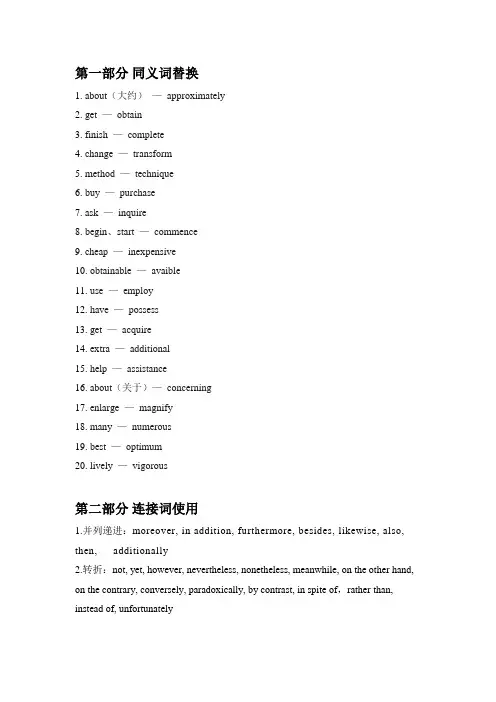
第一部分同义词替换1. about(大约)—approximately2. get —obtain3. finish —complete4. change —transform5. method —technique6. buy —purchase7. ask —inquire8. begin、start —commence9. cheap —inexpensive10. obtainable —avaible11. use —employ12. have —possess13. get —acquire14. extra —additional15. help —assistance16. about(关于)—concerning17. enlarge —magnify18. many —numerous19. best —optimum20. lively —vigorous第二部分连接词使用1.并列递进:moreover, in addition, furthermore, besides, likewise, also, then, additionally2.转折:not, yet, however, nevertheless, nonetheless, meanwhile, on the other hand, on the contrary, conversely, paradoxically, by contrast, in spite of,rather than, instead of, unfortunately3.解释:in other words, in fact, as a matter of fact, that is, namely, in simpler terms4.原因:because, because of, as, since, owing to, due to, thanks to, for this reason5.举例:for example, for instance, as such, such as, take ...for example, to illustrate, to name a few6.强调:surprisingly, interestingly,intriguingly, strikingly, unexpectedly, clearly, obviously, apparently,in fact, indeed, actually, as a matter of fact, undoubtedly7.可能:presumably, probably, perhaps8.让步:although, after all, in spite of..., despite, even if, even though, though, admittedly, given that9.总结:overall, eventually, consequently, in summary, in a word, as a result, together, collectively, thus, hence, consequently, on the whole, in conclusion, to sum up, in brief, to conclude, to summarize, in short, briefly10.结果:therefore, as a result, then, consequently, thus, hence, so, therefore, accordingly, consequently, as consequence11. 对比比较:likewise, similarly, in parallel to, while, whereas第三部分常用句式1. 说明选题的重要性:X is the main / leading / primary / major cause of ..Xs are a common / useful / critical part of...Xs are among the most widely used / commonly discussed / well-known / well-documented / widespread/commonly investigated types of ...X is recognized as being / believed to be / widely considered to be the most important ...It is well known / generally accepted / common knowledge that X is (X)is increasingly becoming / set to become a vital factor in …Xs are undergoing a revolution / generating considerable interest in terms of …Xs are attracting considerable / increasing / widespread interest due to …2. 概述前人做过的研究:Last century X was considered to be / viewed as / seen as the most …Initial / Preliminary / The first studies of X considered it tobe...Tradition ally X / In the history of X, the focus has always been …Scientists / Researchers / Experts have always seen X as …Until now / For many years / Since 1993 Xs have been considered as …X has received much attention in the last two years / in the past decade / over the last two decades …For the past five years / Since 2011 there has been a rapid rise in the use of XsThe last two years have witnessed / seen a huge growth in X …The past decade / last year has seen a renewed importance in X …Recent developments in / findings regarding X have led to …X has become a central / an important / a critical issue in …3. 展望未来:The next decade is likely to see / witness a considerable rise in XIn the next few years X will become / is likely to have becomeWithin the next few years, X is set / destined / likely to become an important component in …By 2025 / Within the next ten years, X will have become …X will soon / shortly / rapidly / inevitably be an issue that …4. 指出知识上的空缺:Few researchers have addressed the problem / issue / question of …Previous work has only focused on / been limited to / failed to address …The central / core problem ofA challenging / An intriguing / An important / A neglected area in the field of...The characteristics of X are not well understood / are misunderstood / have not been dealt with in depth.It is not yet known / has not yet been established whether X can do Y. X is still poorly / not widelyunderstood.Techniques to solve X are computationally demanding / subject to high overheads / time consuming / impractical / frequently unfeasible.A major defect / difficulty / drawback / disadvantage / flaw of X is …One of the main issues in our knowledge of / what we know about X is a lack of …This particular / specific area of X has been overlooked / has b een neglected / remains unclear …Despite this interest, no one to the best of our knowledge / as far as we know has studied …Although this approach is interesting, it suffers from / fails to take into account / does not allow for…However, there is still a need for / has been little discussion on …Moreover, other solutions / research programs / approaches have failed to provide...There is stillsome / much / considerable controversy surrounding …Concerns have arisen / been raised which question / call into q uestion the validity of …In the light of recent events in x, there is now some / much / considerable concern about …5. 论述论文目标和贡献:In this report / paper / review / study we …This paper outlines / proposes / describes / presents a new approach to …This pape r examines / seeks to address / focuses on / discusses / investigates how to solve …This paper is an overview of / a review of / a report on / a preliminary attempt to ...The present paper aims to validate / call into question / refute Peng’s findings regarding …X is presented / described / analyzed / computed / investigated / examined / introduced / discussed in order to …The aim of our work / research / study / analysis was to further / extend / widen / broaden current knowledge of …The aim of this study is to study / evaluate / validate / determine / examine / analyze / calculate / estimate / formulate …This paper calls into question / takes a new look at / re-examines / revisits / sheds new light on …We undertook this study / initiated this research / de veloped this methodology to...We believe that we have found / developed / discovered / designed an innovative solution to …We describe / present / consider / analyze a novel / simple / radical / interesting solution for …。
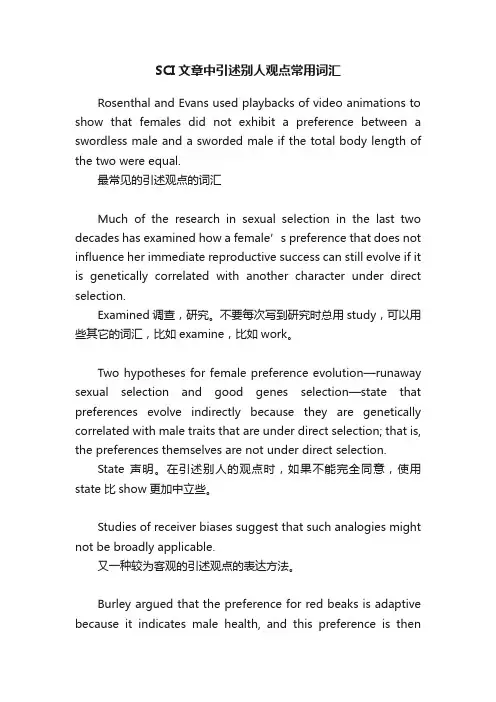
SCI文章中引述别人观点常用词汇Rosenthal and Evans used playbacks of video animations to show that females did not exhibit a preference between a swordless male and a sworded male if the total body length of the two were equal.最常见的引述观点的词汇Much of the research in sexual selection in the last two decades has examined how a female’s preference that does not influence her immediate reproductive success can still evolve if it is genetically correlated with another character under direct selection.Examined 调查,研究。
不要每次写到研究时总用study,可以用些其它的词汇,比如examine,比如work。
Two hypotheses for female preference evolution—runaway sexual selection and good genes selection—state that preferences evolve indirectly because they are genetically correlated with male traits that are under direct selection; that is, the preferences themselves are not under direct selection.State 声明。
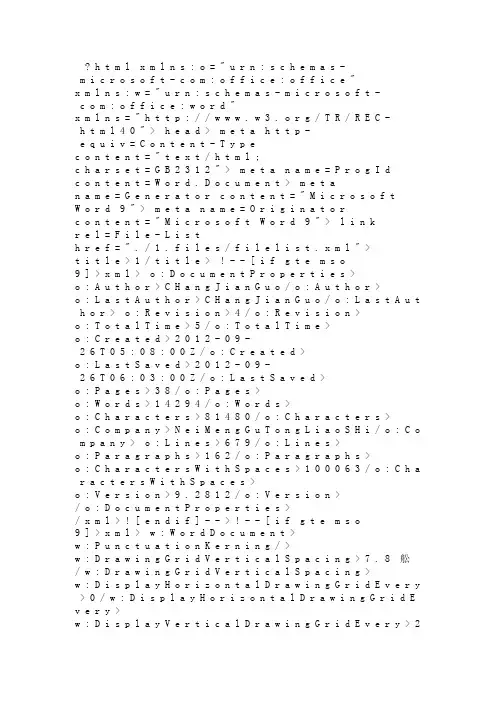
adj. 相关的;切题的;中肯的;有重大关系的;有意义的,目的明确的2. versus ['vɜːsəs]prep. 对;与...相对;对抗3. conversely ['kɒnvɜːslɪ; kən'vɜːslɪ]adv. 相反地4. spatially and temporallyspatially and temporally: 时空分布| 时间和空间| 空间和时间5. ambient ['æmbɪənt]n. 周围环境adj. 周围的;外界的;环绕的Ambient: 阴影色| 周围的| 氛围6. fluctuations [,flʌktju'eiʃəns]n. [物] 波动(fluctuation的复数);变动;起伏现象7. exothermal [,eksəu'θə:mik,-'θə:məl]adj. 放热的;放能的8. in the vicinity of在附近;在上下in the vicinity of: 在附近| 在邻近| 大约9. indicatesv. 表明(indicate的第三人称单数形式);指示,显示Indicates: 指示| 标志着| 表明10. concentrated ['kɒnsntreɪtɪd]adj. 集中的;浓缩的;全神贯注的v. 集中(concentrate的过去分词)concentrated: 专一| 集中的| 中地11. dominate by通过控制,为所左右:;被俯视:12. reveal [rɪ'viːl]vt. 显示;透露;揭露;泄露n. 揭露;暴露;门侧,窗侧Reveal: 透露| 展现| 揭示13. evident ['evɪd(ə)nt]adj. 明显的;明白的evident: 明显的| 可见一斑| 明白的14. predictionsn. 预测,预言(prediction复数形式)predictions: 预测| 预言| 假定15. viscous ['vɪskəs]adj. 粘性的;黏的viscous: 粘滞的| 粘性的| 粘的16. varying ['vɛəriŋ]adj. 不同的;变化的v. 变化,改变(vary的现在分词)adj. 重要的;决定性的;定局的;决断的18. reliable [rɪ'laɪəb(ə)l]n. 可靠的人adj. 可靠的;可信赖的19. adequately ['ædikwitli]adv. 充分地;足够地;适当地adequately: 充分地| 适当地| 足够地20. schematically [ski'mætikli]adv. 计划性地;按照图式schematically: 图示地21. idealized [aɪ'diəl,aɪz]adj. 理想化的v. 把…理想化;以理想的形式表现事物(idealize的过去分词)22. computational domain[流][数] 计算区域23. transient ['trænzɪənt]n. 瞬变现象;过往旅客;候鸟adj. 短暂的;路过的transient: 短暂的| 瞬态| 瞬时的24. derived [di'raivd]v. 得到;推断(derive的过去分词);由而来adj. 导出的;衍生的,派生的derived: 派生| 导出| 推导25. identified as认定为Identified as: 确定为| 找出一样的26. miniaturized小型化miniaturized: 微型化的27. rotational [ro'teʃənl]adj. 转动的;回转的;轮流的28. substantial [səb'stænʃ(ə)l]adj. 大量的;实质的;内容充实的n. 本质;重要材料substantial: 坚固的| 实质的| 大量的29. be responsible for对负责;是的原因Be responsible for: 负责| 对| 承担责任30. increment ['ɪŋkrɪm(ə)nt]n. [数] 增量;增加;增额;盈余increment: 增量| 增额| 定期增加31. periodically [,pɪərɪ'ɒdɪkəlɪ]adv. 定期地;周期性地;偶尔;间歇periodically: 定期地| 周期性地| 周期的32. impact ['ɪmpækt]vt. 影响;撞击;冲突;压紧vi. 冲击;产生影响n. 影响;效果;碰撞;冲击力Impact: 冲击| 影响| 撞击33. impliesv. 意味着(imply的第三人称单数);蕴含;暗指implies: 暗示| 蕴含| 隐隐然34. regimesn. 政治制度,政权,政体( regime的名词复数);组织方法;管理体制;[物理](某类现象发生时所需的,或者某类现象其主导作用时的)物理条件/环境35. inertial [ɪ'nɜːʃ(ə)l]adj. 惯性的;不活泼的36. longitudinal [,lɒn(d)ʒɪ'tjuːdɪn(ə)l; ,lɒŋgɪ-]adj. 长度的,纵向的;经线的37. distortion [dɪ'stɔːʃ(ə)n]n. 变形;[物] 失真;扭曲;曲解38. perturbation [,pɜːtə'beɪʃ(ə)n]n. [数][天] 摄动;不安;扰乱Perturbation: 摄动| 扰动| 微扰39. critical component关键部件关键性部件critical component: 关键部件40. deviation [diːvɪ'eɪʃ(ə)n]n. 偏差;误差;背离Deviation: 偏差| 偏向| 背离41. adjacent to邻近的,毗连的adjacent to: 与临近| 与| 临近42. tangential component切线分量;[数] 切向分量tangential component: 切向分量| 切线分量| 圆周分量43. achieve [ə'tʃiːv]vt. 取得;获得;实现;成功vi. 达到预期的目的,实现预期的结果,如愿以偿44. administer [əd'mɪnɪstə]vt. 管理;执行;给予vi. 给予帮助;执行遗产管理人的职责;担当管理人45. advise [əd'vaɪz]vt. 建议;劝告,忠告;通知;警告vi. 建议;与…商量46. advocate ['ædvəkeɪt]vt. 提倡,主张,拥护n. 提倡者;支持者;律师47. allocate ['æləkeɪt]vt. 分配;拨出;使坐落于vi. 分配;指定48. analyze ['ænə,laɪz]vt. 对…进行分析,分解(等于analyse)49. anticipate [æn'tɪsɪpeɪt]vt. 预期,期望;占先,抢先;提前使用50. apply [ə'plaɪ]vt. 申请;涂,敷;应用vi. 申请;涂,敷;适用;请求51. approve [ə'pruːv]vt. 批准;赞成;为…提供证据vi. 批准;赞成;满意52. arrange [ə'reɪn(d)ʒ]vt. 安排;排列;整理vi. 安排;排列;协商53. assessed [ə'sest]v. 对…进行评估(assess过去时形式)54. assist [ə'sɪst]n. 帮助;助攻vi. 参加;出席vt. 帮助;促进55. attain [ə'teɪn]vt. 达到,实现;获得;到达vi. 达到;获得;到达n. 成就56. audit ['ɔːdɪt]vi. 审计;[审计] 查帐n. 审计;[审计] 查帐vt. (美)旁听57. balance ['bæl(ə)ns]n. 平衡;余额;匀称vt. 使平衡;结算;使相称vi. 保持平衡;相称;抵销n. (Balance)人名;(西)巴兰塞58. brief [briːf]adj. 简短的,简洁的;短暂的,草率的n. 摘要,简报;概要,诉书vt. 简报,摘要;作…的提要n. (Brief)人名;(英)布里夫59. calculate ['kælkjʊleɪt]vi. 计算;以为;作打算vt. 计算;预测;认为;打算60. care [keə]n. 关怀;照料;谨慎;忧虑vi. 照顾;关心;喜爱;顾虑vt. 在意;希望或喜欢n. (Care)人名;(英)凯尔;(塞)察蕾61. coach [kəʊtʃ]n. 教练;旅客车厢;长途公车;四轮大马车vt. 训练;指导vi. 作指导;接受辅导;坐马车旅行n. 蔻驰(皮革品牌)62. collaborate [kə'læbəreɪt]vi. 合作;勾结,通敌63. collected [kə'lektɪd]adj. 镇定的;收集成的v. 收集;聚集(collect的过去式)64. comfort ['kʌmfət]n. 安慰;舒适;安慰者vt. 安慰;使(痛苦等)缓和65. communicate [kə'mjuːnɪkeɪt]vi. 通讯,传达;相通;交流;感染vt. 传达;感染;显露66. compare [kəm'peə]n. 比较vt. 比拟,喻为;[语]构成vi. 相比,匹敌;比较,区别;比拟(常与to连用)n. (Compare)人名;(意)孔帕雷67. complete [kəm'pliːt]adj. 完整的;完全的;彻底的vt. 完成68. compose [kəm'pəʊz]vt. 构成;写作;使平静;排…的版vi. 组成;作曲;排字69. compute [kəm'pjuːt]vt. 计算;估算;用计算机计算vi. 计算;估算;推断n. 计算;估计;推断70. conducted [kən'dʌktid]v. 管理(conduct的过去分词);引导;指挥conducted: 下降的趋势| 统计数据| 分析71. consultedv. 请教,咨询(consult过去式)Consulted: 咨询| 谘询者| 咨询者72. contributedadj. 贡献的,分配的;已缴入的v. 有助于,贡献(contribute的过去分词)Contributed: 功不可没| 已缴入的| 缴入73. converted [kən'vɜːtɪd]adj. 修改的;改变信仰的v. 转变;改变信仰(convert的过去式和过去分词形式)converted: 转换的| 更换信仰的| 冰原历险记74. coordinated [kəu'ɔ:dineitid]adj. 协调的vt. 调整;使调和(coordinate的过去分词);调节;整理coordinated: 协调的| 协同| 协调性75. counseledv. 建议;劝告;忠告;商讨(counsel的过去分词)Counseled: 劝告| 建议| 忠告76. created [krɪ'eɪtɪd]adj. 创造的;引起的v. 创造;建立;造成(creat的过去分词形式)created: 创造的| 创想| 已创建77. decided [dɪ'saɪdɪd]n. 决定(decide的过去式)adj. 明确的;显然的;坚决的,果断的decided: 决定| 确定的| 决定了78. defined [dɪˈfaɪnd]adj. 有定义的,确定的;清晰的,轮廓分明的v. 使明确;给...下定义;使...的轮廓分明(define的过去分词)Defined: 界定| 已定义级| 判断表达式是否合法79. delegatedv. 授权(delegate的过去分词);委托;派代表delegated: 委托| 委派| 代表80. demonstrated演示demonstrated: 如图所示| 已证明的| 示范的81. designed [dɪ'zaɪnd]adj. 有计划的,原意的;故意的v. 设计;计划(design的过去分词)Designed: 设计| 有计划的| 原意的82. developed [dɪ'veləpt]adj. 发达的(国家或地区);成熟的Developed: 发达| 自主开发| 研制出83. devisedv. 设计(devise的过去式和过去分词);计划;发明devised: 设计| 发明| 计划84. diagnosedv. 诊断;被诊断为(diagnose的过去分词)Diagnosed: 诊断| 被诊断处85. directed [daɪ'rɛktɪd]adj. 定向的;经指导的;被控制的v. 指导;管理(direct的过去式和过去分词)Directed: 执导| 导播| 指导86. documented ['dɔkjuməntid]adj. 备有证明文件的documented: 备有证明文件的| 记录| 结果表明87. draftedv. 设计;挑选;拉开(draft的过去分词)DRAFTED: 草稿| 起草| 拟就88. edited ['edɪtɪd]adj. 编辑过的v. [计] 编辑(edit的过去式和过去分词)Edited: 编辑| 编辑过的| 已编辑89. eliminatedv. 被淘汰;消除;排除(eliminate的过去分词)Eliminated: 屡禁不绝| 淘汰| 除去90. enforced [ɪn'fɔrst]adj. 实施的;强制执行的v. 执行(enforce的过去分词)enforced: 强制执行的| 实施的| 强迫的91. enhanced [ɪn'hɑːnst]adj. 加强的;增大的v. 提高;加强(enhance的过去分词)Enhanced: 增强| 增强型| 版本特性92. ensured确保使安全ensured: 确保| 保证了| 被保证的93. established [ɪ'stæblɪʃt]adj. 确定的;已制定的,已建立的Established: 既定| 已制定的| 正式成立94. estimated ['estimetid]adj. 估计的;预计的;估算的Estimated: 预计的| 估计的| 估算的95. evaluatedvi. 评估;估的价(evaluate的过去分词形式)evaluated: 评价| 估| 已评估96. examined [ɪg'zæmɪnd]adj. 检查过的;验讫v. 检查;调查(examine的过去式)Examined: 年审| 检查过的| 检查97. exceeded [ik'si:did]adj. 非常的;过度的;溢出的v. 超过(exceed的过去分词);越出exceeded: 溢出的| 超过| 越出98. expanded [ɪk'spændɪd]adj. 扩充的;展开的vt. 扩大(expand的过去式)expanded: 胀接| 展开的| 扩大99. facilitatedv. 促进;帮助(facilitate的过去分词);使有利发展Facilitated: 促进| 促进了| 易化100. financedv. 提供资金(finance的过去分词);提供经费、筹资financed: 提供经费| 提供资金| 资助101. formulated按配方制造formulated: 阐述| 论证| 用公式表示102. foster ['fɒstə]vt. 抚养,抚育,收养,养育,照料:;培养,助长,促进;孕育;激励,鼓励:adj. 养育的;领养的,寄养的,收养的;照顾孤儿的n. [废语]养父母103. founded ['faundid]adj. 有基础的v. 建立(found的过去分词);创立Founded: 创立| 建立| 创刊104. gained [geind]v. 获得,得到(gain的过去式);增进gained: 得到| 增进| 获得105. generated ['dʒenə,reɪtɪd]adj. 生成的;发生的v. (使)产生(generate的过去分词)generated: 产生| 发生的| 生成106. guided ['ɡaɪdɪd]adj. 有指导的;有向导的v. 指导(guide的过去分词)Guided: 动画| 视频艺术| 引导的107. helpedv. 帮助(help的过去分词)Helped: 帮了| 帮助| 接济108. identified [aɪ'dentɪfaɪd]adj. 被识别的;经鉴定的;被认同者v. 鉴定(identify的过去分词);辨认Identified: 认定| 指认| 被识别的109. implementedadj. 应用的v. 实施(implement的过去分词形式);执行implemented: 执行| 应用的| 贯彻110. improved [im'pru:vd]adj. 改良的;改进过的v. 改进;增加(improve的过去式和过去分词);变得更好improved: 改良的| 提高| 改进111. increased [ɪn'kriːst]adj. 增强的(increase的过去分词)Increased: 升高| 增加的| 增长112. initiated [ɪ'nɪʃɪeɪtɪd]v. 开始,发起;开创(initiate的过去式)Initiated: 开始| 发起| 发动113. instructed [ɪn'strʌktɪd]adj. 受教育的;得到指示的v. 指示;教育(instruct的过去分词形式)instructed: 得到指示的| 指示| 教导114. integrated ['ɪntɪgreɪtɪd]adj. 综合的;完整的;互相协调的v. 整合;使成整体(integrate的过去分词)integrated: 集成的| 整合| 综合的115. interpreted [ɪn'tɜːprɪtɪd]v. 解释;解读(interpret的过去分词形式);口译Interpreted: 解释执行| 解释| 解释型116. introducedadj. 引进的;引种的v. 介绍;引进(introduce的过去分词)Introduced: 出台| 外引| 介绍117. inventedadj. 发明的v. 发明;虚构(invent的过去分词)invented: 发明| 创造| 虚构118. investigatedadj. 研究的;调查的v. 研究(investigate的过去分词);调查investigated: 调查| 研究119. launchedv. 启动;[航] 发射;开始(launch的过去式,过去分词);下水Launched: 正式推出| 上马| 下水120. learned ['lɜːnd]n. (Learned)人名;(英)勒尼德adj. 博学的;有学问的;学术上的learned: 精通某门学问的| 获悉| 所学121. led [led]v. 领导;通向;指引(lead的过去分词)LED: 发光二极管(Light Emitting Diode) | 半导体照明| 光源类型122. maintained [meɪn'teɪnd]adj. 被保持的v. 维护,维修;维持(maintain的过去分词)maintained: 被保持的| 保持| 维持123. managed ['mænidʒd]adj. 托管的;与中央化计划及管制有关的v. 管理;负责;设法完成(manage的过去分词)managed: 托管的| 已管理级| 管理型124. masteredadj. 精通的v. 精通,掌握(master的过去分词)mastered: 精通的| 高明的| 精晓的125. maximizedv. 最大化(maximize的过去式)Maximized: 最大化| 极效| 极限126. mediated ['miːdɪeɪtɪd]vt. 仲裁,调停;调解(mediate的过去式及过去分词形式)mediated: 仲裁| 中介| 媒体上身127. mentoredv. 辅导(mentor的过去形式)Mentored: 辅导128. met [met]n. (Met)人名;(瑞典)梅特v. 遇见(meet的过去式和过去分词)Met: 蛋氨酸| 甲硫氨酸| 代谢当量129. minimizedadj. 最小化的;最小化;使达到最低限度的v. 使减少;使缩到最小;极度轻视(minimize的过去分词形式)minimized: 最小化的| 使减到最少| 使达到最低限度的130. modified ['mɔdifaid]adj. 改进的,修改的;改良的v. 修改;缓和(modify的过去分词)Modified: 加减| 修改| 改性131. monitoredv. 指导,检测;[自] 监控(monitor的过去分词)monitored: 监控的| 被观察| 监视132. negotiated [nɪ'ɡəʊʃieɪtid]adj. 商谈的v. 谈判,协商(negotiate过去式和过去分词形式)negotiated: 商谈的| 谈成| 谈判133. observed [əb'zɜːvd]adj. 观察的;观测的v. 观察;遵守;注意到(observe的过去分词形式)observed: 观察的| 观察模式| 索赔134. obtained [əb'teɪnd]v. 获得(obtain的过去分词)Obtained: 求得| 获得| 求出135. offered [ɔ:fəd]adj. 提供的,提议的v. 提供,提议;奉献(offer过去时态)Offered: 参团| 已参团| 提供136. operatedadj. 操作的v. 操作(operate的过去式和过去分词)operated: 国营的| 气动的| 操作的137. organized ['ɔ:ɡənaizd]adj. 有组织的;安排有秩序的;做事有条理的v. 组织(organize的过去分词)Organized: 有组织的| 做事有条理的| 安排有序的138. overcame [,ovɚ'kem]v. 克服(overcome的过去式)overcame: 克服| 击退| 战胜139. oversaw [,əuvə'sɔ:]vt. 看管,管理;视察;监视oversaw: 视察| 监视| 监督140. participatedv. 参与;分享(participate的过去式)participated: 参加| 参与| 参加了141. partner ['pɑːtnə]n. 伙伴,同伴;合作者;同伙;合股人;合伙人;股东vt. 同合作(或合伙);做的伙伴;使结成一对:;使有配手(或搭档):vi. 合伙;合股;成为搭档:142. performedv. 执行,表演(perform的过去分词形式)performed: 执行| 履行| 完成143. planned [plænd]adj. 有计划的;根据计划的v. 打算(plan的过去分词);设计Planned: 按计划| 计划性| 计划144. prepared [pri'peəd]adj. 准备好的;精制的v. 准备(prepare的过去分词)Prepared: 拟定| 准备好的| 单位145. presentedv. 提出(present的过去分词);呈递,提供Presented: 赠送| 敬献| 颁赠146. prioritizedv. 优先化(prioritize的过去分词)Prioritized: 优先化147. produced [prəʊ'djuːst]adj. 引长的;畸形地伸长的v. 产生;制造(produce的过去式和过去分词);创作Produced: 出品| 摄制| 畸形地伸长的148. programmed ['prəuɡræmd, -ɡrəmd]adj. 程序化的,程控的v. 规划;制作节目(program的过去分词)Programmed: 编程| 程序化| 规划149. projected [prə'dʒektid]adj. 投影的,投射v. 投射(project的过去分词);计划Projected: 投射| 预计的| 被预测150. proposed [prəu'pəuzd]adj. 被提议的;所推荐的v. 提议;计划(propose的过去式和过去分词)proposed: 被提议的| 拟建| 提出151. provided [prə'vaɪdɪd]conj. 假如;倘若v. 提供;给予(provide的过去式)provided: 倘若| 假如| 只要152. raised [reɪzd]adj. 凸起的;发酵的;浮雕的v. 提高(raise的过去时和过去分词);举起;抚育,抚养Raised: 凸起| 调升| 浮雕的153. ran [ræn]n. (Ran)人名;(俄、瑞典、塞)拉恩;(柬)兰v. 跑(run的过去式)RAN: 无线接入网(Radio Access Network) | 乱| 无线接入网络154. received [rɪ'siːvd]adj. 被一般承认的;被认为标准的v. 收到;接受;迎接(receive的过去分词)Received: 接到| 领到| 受过155. recommended [rekə'mendid]adj. 被推荐的v. 推荐,介绍;建议(recommend的过去分词)recommended: 被推荐的| 被介绍的| 推荐人156. reduced [rɪ'djuːst]adj. 减少的;[数] 简化的;缩减的Reduced: 沦为| 减小| 降为157. reorganizedadj. 重组的;重新制定的v. 重组(reorganize的过去分词);整顿;重新制定reorganized: 重新制定| 重组| 重新组织158. reported [ri'pɔ:tid]adj. 报告的;据报道的v. 报道(report的过去分词);报告;记录Reported: 报道| 上报| 有报道称159. researchedadj. 研究过的;调查过的v. 研究;调查(research的过去分词)Researched: 研究| 调查| 向后160. respondedv. 回答,回报;反应(respond的过去分词)responded: 反应161. reviewedv. 复习;评估;评论;检讨(review的过去分词形式)reviewed: 修订| 同行评议| 同行评审162. revised [ri'vaizd]adj. 改进的v. 修改;校订;复习(revise的过去分词形式)revised: 修订| 改进的| 帝苑轩163. screened ['skri:nd]adj. 筛过的,屏蔽的screened: 屏蔽的| 筛过的屏蔽的| 筛过的164. servedv. 服务(serve的过去分词);服役;招待;发球Served: 当过| 服役| 服务165. sold [səʊld]n. (Sold)人名;(瑞典)索尔德v. 卖,销售(sell的过去式和过去分词)Sold: 售出| 售完| 出售166. solvedadj. 解决了的v. 解决(solve的过去式);解答Solved: 告破| 解开了| 一了百了167. strategizedvi. strategize的变形168. streamlined ['striːmlaɪnd]adj. 流线型的;改进的;最新型的v. 使成流线型;使合理化(streamline的过去式和过去分词)streamlined: 流线型的| 最新型的| 吝形的169. strengthenedv. 加强(strengthen的过去式)strengthened: 加强| 强化| 加固的170. studied ['stʌdɪd]adj. 有计划的;故意的v. 学习(study的过去式)studied: 故意的| 学习| 慎重的171. succeededv. 成功;继承(succeed过去分词)Succeeded: 成功| 承购| 获得成效172. supervised ['sju:pəvaizd]adj. 有监督的v. 监督(supervise的过去式和过去分词);指导Supervised: 监督| 有监督| 监督式173. supportedn. 被支持的v. 支持(support的过去分词)supported: 支持| 被支持| 能依174. targeted ['tɑːɡɪtɪd]adj. 定向的;被定为攻击目标的v. 把作为目标(target的过去分词)Targeted: 针对性| 目标点| 定向的175. taught [tɔːt]v. 教授(teach的过去分词)Taught: 人教| 讲解| 授课式176. team [tiːm]n. (一)队(人);(一)组(人);(一起拉车或拉犁的)一队马(或牛);联畜;联兽;一组牲畜及它们拉的车vt. 把(牛、马等)套在一辆车上:;用联畜运:vi. 赶联畜;驾驶联畜运输车;当车把式;当卡车司机177. tested ['testɪd]adj. 经受过考验的;经验定的v. 考验(test的过去分词);测验tested: 检测| 经受过考验的| 测试178. trained [treɪnd]adj. 培训;训练过的,受过培训的v. 训练(train的过去分词)Trained: 练就| 训练有素| 受过训练的179. upgraded ['ʌpgreidid]adj. 提升的;更新的;加固的v. 升级;改善(upgrade的过去分词)Upgraded: 升格| 加固| 提升180. utilizedadj. 被利用的v. 利用(utilize的过去分词)Utilized: 利用181. validatedadj. 经过验证的v. 确认(validate的过去式及过去分词形式);使生效Validated: 经过验证的| 验证| 确认182. visualized [viʒuə,laizd]adj. 直观的;直视的v. 使形象化;想像(visualize的过去分词)visualized: 使形象化| 可视化| 直视的183. won [wʌn]vt. 赢得(win的过去式和过去分词)Won: 拿下| 世界对抗网路系统| 夺得184. wrote [rəʊt]v. 写(write的过去式)wrote: 书写| 写| 写作185. transverse [trænz'vɜːs; trɑːnz-; -ns-]n. 横断面;贯轴;横肌adj. 横向的;横断的;贯轴的transverse: 横向的| 横的| 横间的186. transient regime瞬变状态transient regime: 瞬态状态| 瞬变状态187. thermally insulatedthermally insulated: 隔热的188. independent variables自变量;独立变量independent variables: 自变量| 自变数| 自变项189. acoustic performance声学性能acoustic performance: 声学性能| 声性能| 声学特性。
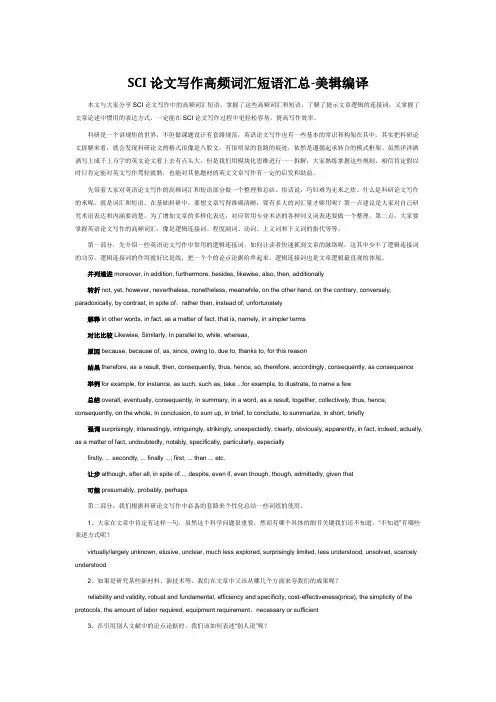
SCI论文写作高频词汇短语汇总-美辑编译本文与大家分享SCI论文写作中的高频词汇短语。
掌握了这些高频词汇和短语,了解了提示文章逻辑的连接词,又掌握了文章论述中惯用的表达方式,一定能在SCI论文写作过程中更轻松容易,提高写作效率。
科研是一个讲规矩的世界,不但做课题设计有套路规范,英语论文写作也有一些基本的常识和构架在其中,其实把科研论文拆解来看,就会发现科研论文的格式很像是八股文,有很明显的套路的痕迹,依然是遵循起承转合的模式框架。
虽然洋洋洒洒写上成千上万字的英文论文看上去有点头大,但是我们用模块化思维进行一一拆解,大家熟练掌握这些规则,相信肯定假以时日肯定能对英文写作驾轻就熟,也能对其他题材的英文文章写作有一定的启发和助益。
先带着大家对英语论文写作的高频词汇和短语部分做一个整理和总结。
俗话说,巧妇难为无米之炊。
什么是科研论文写作的米呢,就是词汇和短语。
在基础科研中,要想文章写得准确清晰,要有多大的词汇量才够用呢?第一点建议是大家对自己研究术语表达和内涵要清楚,为了增加文章的多样化表达,对应常用专业术语的各种同义词表述要做一个整理。
第二点,大家要掌握英语论文写作的高频词汇,像是逻辑连接词、程度副词、动词、上义词和下义词的指代等等。
第一部分,先介绍一些英语论文写作中常用的逻辑连接词。
如何让读者快速抓到文章的脉络呢,这其中少不了逻辑连接词的功劳,逻辑连接词的作用就好比是线,把一个个的论点论据给串起来。
逻辑连接词也是文章逻辑最直观的体现。
并列递进moreover, in addition, furthermore, besides, likewise, also, then, additionally转折not, yet, however, nevertheless, nonetheless, meanwhile, on the other hand, on the contrary, conversely, paradoxically, by contrast, in spite of,rather than, instead of, unfortunately解释in other words, in fact, as a matter of fact, that is, namely, in simpler terms对比比较Likewise, Similarly, In parallel to, while, whereas,原因because, because of, as, since, owing to, due to, thanks to, for this reason结果therefore, as a result, then, consequently, thus, hence, so, therefore, accordingly, consequently, as consequence 举例for example, for instance, as such, such as, take ...for example, to illustrate, to name a few总结overall, eventually, consequently, in summary, in a word, as a result, together, collectively, thus, hence, consequently, on the whole, in conclusion, to sum up, in brief, to conclude, to summarize, in short, briefly 强调surprisingly, interestingly, intriguingly, strikingly, unexpectedly, clearly, obviously, apparently, in fact, indeed, actually, as a matter of fact, undoubtedly, notably, specifically, particularly, especiallyfirstly, ... secondly, ... finally ...; first, ... then ... etc.让步although, after all, in spite of..., despite, even if, even though, though, admittedly, given that可能presumably, probably, perhaps第二部分,我们根据科研论文写作中必备的套路来个性化总结一些词组的使用。
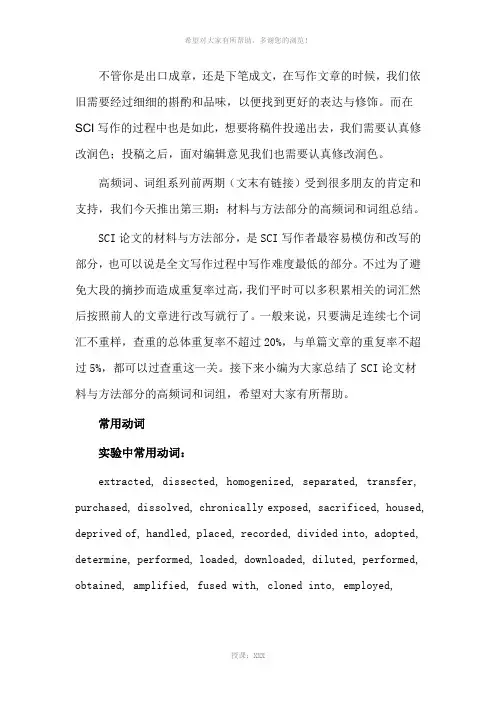
不管你是出口成章,还是下笔成文,在写作文章的时候,我们依旧需要经过细细的斟酌和品味,以便找到更好的表达与修饰。
而在SCI写作的过程中也是如此,想要将稿件投递出去,我们需要认真修改润色;投稿之后,面对编辑意见我们也需要认真修改润色。
高频词、词组系列前两期(文末有链接)受到很多朋友的肯定和支持,我们今天推出第三期:材料与方法部分的高频词和词组总结。
SCI论文的材料与方法部分,是SCI写作者最容易模仿和改写的部分,也可以说是全文写作过程中写作难度最低的部分。
不过为了避免大段的摘抄而造成重复率过高,我们平时可以多积累相关的词汇然后按照前人的文章进行改写就行了。
一般来说,只要满足连续七个词汇不重样,查重的总体重复率不超过20%,与单篇文章的重复率不超过5%,都可以过查重这一关。
接下来小编为大家总结了SCI论文材料与方法部分的高频词和词组,希望对大家有所帮助。
常用动词实验中常用动词:extracted, dissected, homogenized, separated, transfer, purchased, dissolved, chronically exposed, sacrificed, housed, deprived of, handled, placed, recorded, divided into, adopted, determine, performed, loaded, downloaded, diluted, performed, obtained, amplified, fused with, cloned into, employed,construct, described, allows, governs, implemented, split into, carried out, harboring, generate, incorporate,两物之间关系:compare to/with,depend on, based on, relies on, (strongly) associated with/to, related to,“认为,说明” 的N种描述方式:assume, states, indicated, suggested, demonstrated, considered as分配描述:respectively, randomly assigned, simultaneously, predominantly, mutually exclusive patterns.动物处置:anesthetized, decapitated实验过程连接词介绍实验过程的时候,肯定免不了对实验顺序的介绍。
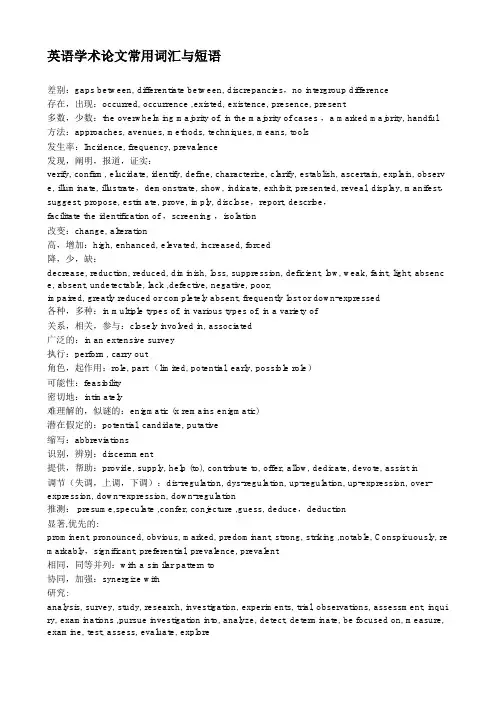
英语学术论文常用词汇与短语差别:gaps between, differentiate between, discrepancies,no intergroup difference存在,出现:occurred, occurrence ,existed, existence, presence, present多数,少数:the overwhelming majority of, in the majority of cases ,a marked majority, handful 方法:approaches, avenues, methods, techniques, means, tools发生率:Incidence, frequency, prevalence发现,阐明,报道,证实:verify, confirm, elucidate, identify, define, characterize, clarify, establish, ascertain, explain, observ e, illuminate, illustrate,demonstrate, show, indicate, exhibit, presented, reveal, display, manifest,suggest, propose, estimate, prove, imply, disclose,report, describe,facilitate the identification of ,screening ,isolation改变:change, alteration高,增加:high, enhanced, elevated, increased, forced降,少,缺:decrease, reduction, reduced, diminish, loss, suppression, deficient, low, weak, faint, light, absenc e, absent, undetectable, lack ,defective, negative, poor,impaired, greatly reduced or completely absent, frequently lost or down-expressed各种,多种:in multiple types of, in various types of, in a variety of关系,相关,参与:closely involved in, associated广泛的:in an extensive survey执行:perform, carry out角色,起作用:role, part (limited, potential, early, possible role)可能性:feasibility密切地:intimately难理解的,似谜的:enigmatic (x remains enigmatic)潜在假定的:potential, candidate, putative缩写:abbreviations识别,辨别:discernment提供,帮助:provide, supply, help (to), contribute to, offer, allow, dedicate, devote, assist in调节(失调,上调,下调):dis-regulation, dys-regulation, up-regulation, up-expression, over-expression, down-expression, down-regulation推测: presume,speculate ,confer, conjecture ,guess, deduce,deduction显著,优先的:prominent, pronounced, obvious, marked, predominant, strong, striking ,notable, Conspicuously, re markably,significant, preferential, prevalence, prevalent相同,同等并列:with a similar pattern to协同,加强:synergize with研究:analysis, survey, study, research, investigation, experiments, trial, observations, assessment, inqui ry, examinations ,pursue investigation into, analyze, detect, determinate, be focused on, measure, examine, test, assess, evaluate, explore一致:which is in accord with the results,which corroborated the results which supported the results优缺点:merits and drawbacks,beneficial and detrimental异常:aberration, abnormality重要:crucial, key, important, major, be of critical importance相反:On the contrary, In contrary,but quite on the contrary,in sharp contrast, contrary to what would be expected,Contrary to the expectation that 与一起:in combination with, coupled with由于、鉴于:In light of,In view that。
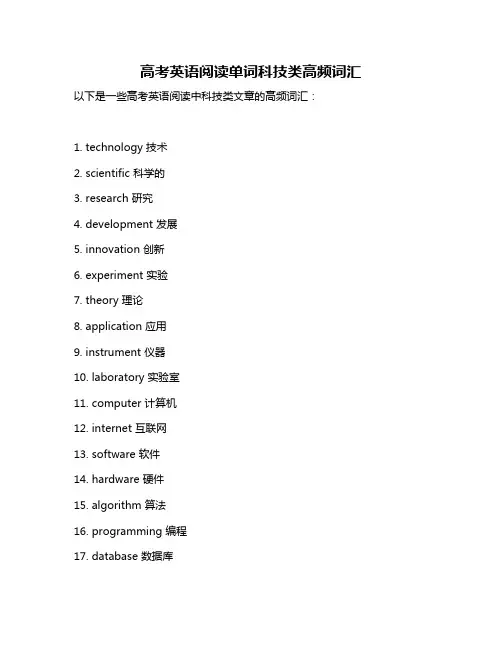
高考英语阅读单词科技类高频词汇以下是一些高考英语阅读中科技类文章的高频词汇:1. technology 技术2. scientific 科学的3. research 研究4. development 发展5. innovation 创新6. experiment 实验7. theory 理论8. application 应用9. instrument 仪器10. laboratory 实验室11. computer 计算机12. internet 互联网13. software 软件14. hardware 硬件15. algorithm 算法16. programming 编程17. database 数据库18. network 网络19. cellphone 手机20. chip 芯片21. nanotechnology 纳米技术22. robot 机器人23. satellite 卫星24. rocket 火箭25. spacecraft 宇宙飞船26. telescope 望远镜27. microscope 显微镜28. genetics 遗传学29. DNA 脱氧核糖核酸30. protein 蛋白质31. virus 病毒32. antibiotic 抗生素33. gene 基因34. mutation 突变35. telescope 望远镜36. atom 原子37. molecule 分子38. neutron 中子39. proton 质子40. electron 电子41. nucleus 原子核42. quantum 量子43. photons 光子44. wavelength 波长45. frequency 频率46. radiation 辐射47. radioactive 有放射性的48. stable 稳定的49. unstable 不稳定的50. reactor 反应堆。
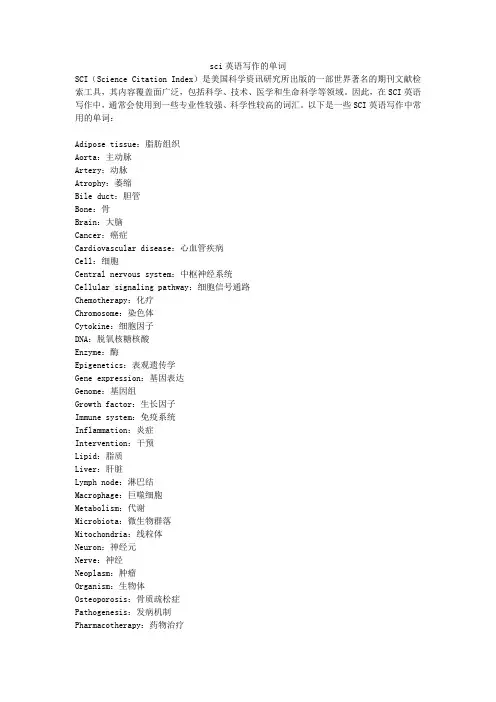
sci英语写作的单词SCI(Science Citation Index)是美国科学资讯研究所出版的一部世界著名的期刊文献检索工具,其内容覆盖面广泛,包括科学、技术、医学和生命科学等领域。
因此,在SCI英语写作中,通常会使用到一些专业性较强、科学性较高的词汇。
以下是一些SCI英语写作中常用的单词:Adipose tissue:脂肪组织Aorta:主动脉Artery:动脉Atrophy:萎缩Bile duct:胆管Bone:骨Brain:大脑Cancer:癌症Cardiovascular disease:心血管疾病Cell:细胞Central nervous system:中枢神经系统Cellular signaling pathway:细胞信号通路Chemotherapy:化疗Chromosome:染色体Cytokine:细胞因子DNA:脱氧核糖核酸Enzyme:酶Epigenetics:表观遗传学Gene expression:基因表达Genome:基因组Growth factor:生长因子Immune system:免疫系统Inflammation:炎症Intervention:干预Lipid:脂质Liver:肝脏Lymph node:淋巴结Macrophage:巨噬细胞Metabolism:代谢Microbiota:微生物群落Mitochondria:线粒体Neuron:神经元Nerve:神经Neoplasm:肿瘤Organism:生物体Osteoporosis:骨质疏松症Pathogenesis:发病机制Pharmacotherapy:药物治疗Prostaglandin:前列腺素Receptor:受体RNA:核糖核酸Stem cell:干细胞Tissue engineering:组织工程学Tumor suppressor gene:肿瘤抑制基因Vaccine:疫苗Vasculature:血管系统Vascular disease:血管疾病Ventricular hypertrophy:心室肥厚Virus:病毒Xenobiotics:外源性物质。
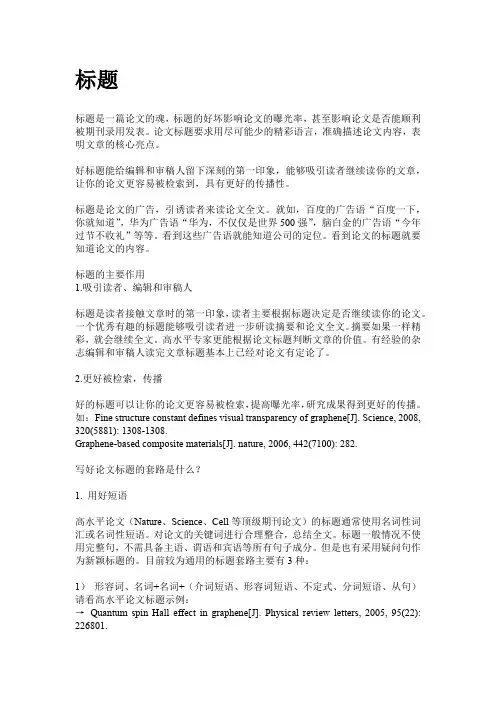
标题标题是一篇论文的魂,标题的好坏影响论文的曝光率,甚至影响论文是否能顺利被期刊录用发表。
论文标题要求用尽可能少的精彩语言,准确描述论文内容,表明文章的核心亮点。
好标题能给编辑和审稿人留下深刻的第一印象,能够吸引读者继续读你的文章,让你的论文更容易被检索到,具有更好的传播性。
标题是论文的广告,引诱读者来读论文全文。
就如,百度的广告语“百度一下,你就知道”,华为广告语“华为,不仅仅是世界500强”,脑白金的广告语“今年过节不收礼”等等。
看到这些广告语就能知道公司的定位。
看到论文的标题就要知道论文的内容。
标题的主要作用1.吸引读者、编辑和审稿人标题是读者接触文章时的第一印象,读者主要根据标题决定是否继续读你的论文。
一个优秀有趣的标题能够吸引读者进一步研读摘要和论文全文。
摘要如果一样精彩,就会继续全文。
高水平专家更能根据论文标题判断文章的价值。
有经验的杂志编辑和审稿人读完文章标题基本上已经对论文有定论了。
2.更好被检索,传播好的标题可以让你的论文更容易被检索,提高曝光率,研究成果得到更好的传播。
如:Fine structure constant defines visual transparency of graphene[J]. Science, 2008, 320(5881): 1308-1308.Graphene-based composite materials[J]. nature, 2006, 442(7100): 282.写好论文标题的套路是什么?1. 用好短语高水平论文(Nature、Science、Cell等顶级期刊论文)的标题通常使用名词性词汇或名词性短语。
对论文的关键词进行合理整合,总结全文。
标题一般情况不使用完整句,不需具备主语、谓语和宾语等所有句子成分。
但是也有采用疑问句作为新颖标题的。
目前较为通用的标题套路主要有3种:1)形容词、名词+名词+(介词短语、形容词短语、不定式、分词短语、从句)请看高水平论文标题示例:→Quantum spin Hall effect in graphene[J]. Physical review letters, 2005, 95(22): 226801.→Chemically derived, ultrasmooth graphene nanoribbon semiconductors[J]. science, 2008, 319(5867): 1229-1232.→Fine structure constant defines visual transparency of graphene[J]. Science, 2008, 320(5881): 1308-1308.2) 名词性短语A : 名词性短语B(或名词性短语A : 名词性短语B,名词性短语C,名词性短语D...)请看高水平论文标题示例:Graphene: status and prospects[J]. science, 2009, 324(5934): 1530-1534. Honeycomb carbon: a review of graphene[J]. Chemical reviews, 2009, 110(1): 132-145. Graphene and graphene oxide: synthesis, properties, and applications[J]. Advanced materials, 2010, 22(35): 3906-3924.2. 疑问句标题疑问句能够引起读者的好奇,有很强的欲望继续读下去。
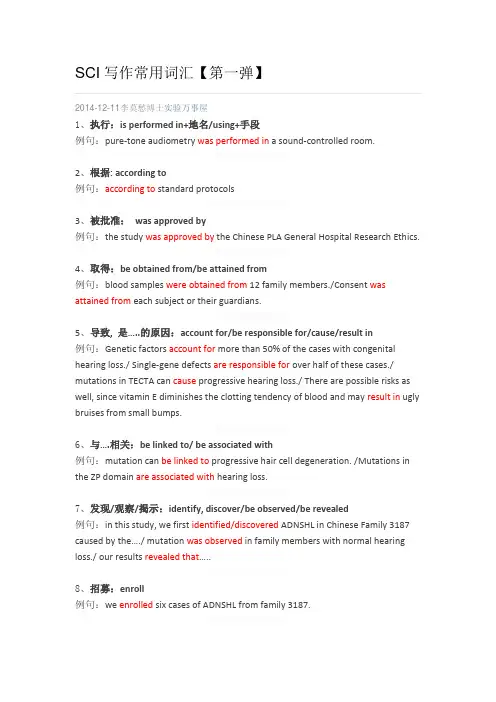
SCI写作常用词汇【第一弹】2014-12-11李莫愁博士实验万事屋1、执行:is performed in+地名/using+手段例句:pure-tone audiometry was performed in a sound-controlled room.实验万事屋作品2、根据: according to例句:according to standard protocols实验万事屋作品3、被批准:was approved by例句:the study was approved by the Chinese PLA General Hospital Research Ethics.实验万事屋作品4、取得:be obtained from/be attained from例句:blood samples were obtained from 12 family members./Consent was attained from each subject or their guardians.实验万事屋作品5、导致, 是…..的原因:account for/be responsible for/cause/result in例句:Genetic factors account for more than 50% of the cases with congenital hearing loss./ Single-gene defects are responsible for over half of these cases./ mutations in TECTA can cause progressive hearing loss./ There are possible risks as well, since vitamin E diminishes the clotting tendency of blood and may result in ugly bruises from small bumps.实验万事屋作品6、与….相关:be linked to/ be associated with例句:mutation can be linked to progressive hair cell degeneration. /Mutations in the ZP domain are associated with hearing loss.实验万事屋作品7、发现/观察/揭示:identify, discover/be observed/be revealed例句:in this study, we first identified/discovered ADNSHL in Chinese Family 3187 caused by the…./ mutation was observed in family members with normal hearing loss./ our results revealed that…..实验万事屋作品8、招募:enroll例句:we enrolled six cases of ADNSHL from family 3187.实验万事屋作品9、确认:confirm例句:we confirmed two mutations at the same allele.实验万事屋作品10、预测:predict例句:the fetus carried the mutation TECTA was predicted to inherit his father’s hearing.实验万事屋作品11、证明/论证:demonstrate例句:all six subjects had hearing loss , demonstrating severe hearing impairment according to WHO 1997 criteria.实验万事屋作品12、暗示:implicate例句:this was implicated as a pathogenic mutation causing hearing loss.实验万事屋作品13、表明:indicate例句:The method does not indicate which species, or how many mosquitoes, deposited viruses on the cards.实验万事屋作品14、据我们所知:to our knowledge例句:To our knowledge, this is the second TECTA mutation identified in Chinese population.实验万事屋作品15、迄今为止:so far例句:so far, there is no clinical genetic diagnosis for ADNSHL in China.实验万事屋作品16、在…..中起重要作用:play an important role in例句:a-tectorin plays an important role in the structure and function of the TM.。
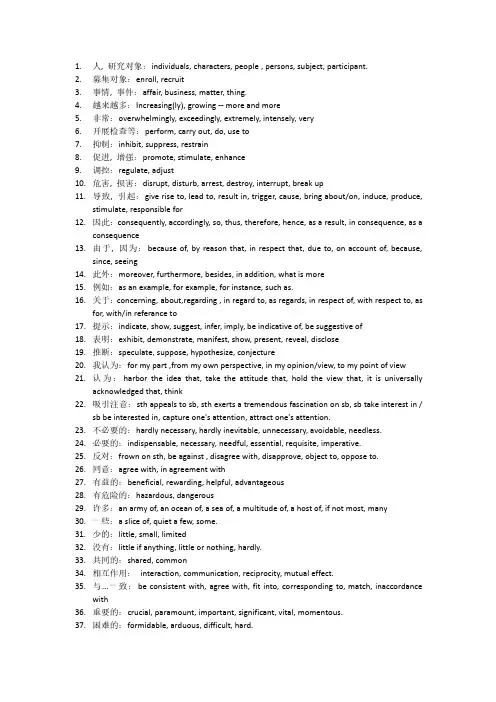
1.人,研究对象:individuals,characters,people,persons,subject,participant.2.募集对象:enroll,recruit3.事情,事件:affair,business,matter,thing.4.越来越多:Increasing(ly),growing--more and more5.非常:overwhelmingly,exceedingly,extremely,intensely,very6.开展检查等:perform,carry out,do,use to7.抑制:inhibit,suppress,restrain8.促进,增强:promote,stimulate,enhance9.调控:regulate,adjust10.危害,损害:disrupt,disturb,arrest,destroy,interrupt,break up11.导致,引起:give rise to,lead to,result in,trigger,cause,bring about/on,induce,produce,stimulate,responsible for12.因此:consequently,accordingly,so,thus,therefore,hence,as a result,in consequence,as aconsequence13.由于,因为:because of,by reason that,in respect that,due to,on account of,because,since,seeing14.此外:moreover,furthermore,besides,in addition,what is more15.例如:as an example,for example,for instance,such as.16.关于:concerning,about,regarding,in regard to,as regards,in respect of,with respect to,asfor,with/in referance to17.提示:indicate,show,suggest,infer,imply,be indicative of,be suggestive of18.表明:exhibit,demonstrate,manifest,show,present,reveal,disclose19.推断:speculate,suppose,hypothesize,conjecture20.我认为:for my part,from my own perspective,in my opinion/view,to my point of view21.认为:harbor the idea that,take the attitude that,hold the view that,it is universallyacknowledged that,think22.吸引注意:sth appeals to sb,sth exerts a tremendous fascination on sb,sb take interest in/sb be interested in,capture one's attention,attract one's attention.23.不必要的:hardly necessary,hardly inevitable,unnecessary,avoidable,needless.24.必要的:indispensable,necessary,needful,essential,requisite,imperative.25.反对:frown on sth,be against,disagree with,disapprove,object to,oppose to.26.同意:agree with,in agreement with27.有益的:beneficial,rewarding,helpful,advantageous28.有危险的:hazardous,dangerous29.许多:an army of,an ocean of,a sea of,a multitude of,a host of,if not most,many30.一些:a slice of,quiet a few,some.31.少的:little,small,limited32.没有:little if anything,little or nothing,hardly.33.共同的:shared,common34.相互作用:interaction,communication,reciprocity,mutual effect.35.与...一致:be consistent with,agree with,fit into,corresponding to,match,inaccordancewith36.重要的:crucial,paramount,important,significant,vital,momentous.37.困难的:formidable,arduous,difficult,hard.38.典型的:quintessential,typical,representative,classic39.总结来说:in conclusion,in summery,in a word,to sum up,all in all,as a conclusion40.常见的连接词:However,also,in addition,consequently,afterwards,further,although,unlike,in contrast,Similarly,Unfortunately,alternatively,parallel results,In order to,despite, Compared with,other results。
大学英语四级作文高频词汇总结.1.随着经济的繁荣with the booming of the economy2. 随着人民生活水平的显著提高with the remarkable improvement of people‘s livingstandard3. 先进的科学技术advanced science and technology4. 为我们日常生活增添了情趣add much spice / flavor to our daily life5. 人们普遍认为It is commonly believed that…6. 我同意前者(后者)观点I give my vote to the former / latter opinion.7. 引起了广泛的公众关注Sth. has aroused wide public concern. / Sth has drawn greatpublic attention.8. 不可否认It is undeniable that…9. 热烈的讨论/ 争论a heated discussion / debate10. 有争议性的问题a controversial issue11. 就我而言/ 就个人而言As far as I am concerned,/ Personally,12. 有充分的理由支持be supported by sound reasons13. 双方的论点argument on both sides14. 发挥日益重要作用play an increasingly important role in…15. 对…必不可少be indispensable to …16. 正如谚语所说As the proverb goes:17. 对…产生有利/不利的影响exert positive / negative effects on…18. 利远远大于弊The advantages far outweigh the disadvantages.19. 导致,引起lead to / give rise to / contribute to / result in20. 复杂的社会现象a complicated social phenomenon21. 长远利益long-tem interest22. …有其自身的优缺点…has its own merits and demerits / pros and cons23. 对…有害do harm to / be harmful to / be detrimental to24. 交流思想/ 情感/ 信息exchange ideas / emotions / information25. 跟上…的最新发展keep pace with / keep abreast with the latest development of…26. …的健康发展the healthy development of…27. 重视attach great importance to…28. 社会地位social status29. 把时间和精力放在…上focus one‘s time and energy on…30. 扩大知识面expand one‘s scope of knowledge31. 身心两方面both physically and mentally32. 有直接/间接关系be directly / indirectly related to…33. 导致很多问题give rise to / lead to / spell various problems34. 可以替代think的词believe,claim,maintain,argue,insist,hold the opinion / belief / view that35. 缓解压力/ 减轻负担relieve stress / burden36. 优先考虑/发展… give (top)priority to sth.37. 与…比较compared with…/ in comparison with38. 可降解的/可分解的材料degradable / decomposable material39. 代替replace / substitute / take the place of40. 提供就业机会offer job opportunities。
SCI论文准备写作投稿技巧常用英文词汇汇总1. Introduction:- Abstract: 摘要- Literature review: 文献综述- Research question: 研究问题- Objectives: 目标- Significance: 重要性- Hypothesis: 假设2. Methodology:- Experimental design: 实验设计- Variables: 变量- Data collection: 数据收集- Sampling method: 抽样方法- Statistical analysis: 统计分析- Ethical considerations: 道德考虑3. Results:- Findings: 结果- Statistical significance: 统计显著性- Data interpretation: 数据解释- Figures and tables: 图表- Correlation analysis: 相关分析4. Discussion:- Interpretation: 解释- Limitations: 限制- Implications: 含义- Future research: 未来研究5. Conclusion:- Summary: 总结- Contributions: 贡献- Closing remarks: 结束语6. References:- In-text citations: 文中引用- Peer-reviewed journal: 同行评审的期刊7. Formatting:- Font size: 字体大小- Line spacing: 行间距- Margins: 边距- Title page: 标题页- Abstract word count: 摘要字数注:本回答主要列举了一些在科学论文写作中常用的词汇,但具体使用词汇还需根据文章的主题和内容进行选择。
Simplified EnglishWhat Is Simplified English?Simplified English(SE)was developed so that documents written in English could be understood by people who speak little English.To make the documents easier to understand,Simplified English uses a limited vocabulary and a set of writing rules.The writer can only use words on the approved list and technical terms(words common to tilefield).Each word on the list has only one approved definition.For example,“about”is used for“concerned with.”It cannot be used for“around”or“approximately.”Verb tenses are also restricted.The rules listed below were developed for the AECMA.The principles for simplified English can be used even if AECMA rules are not strictly followed.Many of the words on the AECMA approved list would not be needed for Church products.Many words needed for Church products are not on the AECMA approved list.Example of Simplified EnglishOriginal paragraph:Place the water heater in a clean, dry location as near as practical to the area of greatest heated water demand. Long uninsulated hot water lines can waste energy and water. Clearance for accessibility to per-mit inspection and servicing such as removing heating elements or checking controls must be provided.Same paragraph in Simplified English:Put the water heater in a clean, dry location near the area where you use the most hot water. If the hot water lines are long and they do not have insulation, you will use too much energy and water. Make sure you have access to the heating elements and the controls for inspection and servicing.(The above example is from“Learning to Use Simplified English:A Preliminary Study,”by Margaret Thomas, Gloria Jaffe,J.Peter Kincaid,and Yvette Stees,Technical Communication,First Quarter1992,pg70)AECMA Simplified English RulesWordse only approved words.e approved words only as the part of speech given. (example: close is a verb [and not an adverb].Write: Do not go near the landing gear if... NOT: Do not go close to the landing gear if...)3.Keep the approved meaning; do not add any other meaning. (example: Follow means “to come after.” Itdoes not mean “to do what the rules tell you.” Write: Obey the safety instructions. NOT: Follow the safety instructions.Technical Names4.You can use words that are “Technical Names.” (These words are not part of the attached list of words.)A word, symbol, or term is a “technical name” if it is in one of these categories: names of: official parts,locations on aircraft, tools or equipment, materials, support facilities, circuits or systems, persons, groups, or bodies, technical records, standards, regulations, and the following categories of terms: math-ematical, scientific, engineering, navigational and flying, measurement or dial markings, number, parts of the body, common personal effects, medical, documents and manuals, names, headings, & topics usedin specifications, environmental conditions, colors, damage terms. (The categories are from the aero-space industry. Another list would be needed for Family History.)e a technical name only as a noun or an adjective, not as a verb.e the official name (shortened if necessary) as much as possible.7.Do not use different technical names for the same thing.8.If you have a choice, use the shortest and simplest names.Verbs9.You can use the verb in these tenses: the infinitive, the present tense, the past tense, the simple futuretense, and the past participle (as an adjective). (example: To adjust; It adjusts; It adjusted; It will adjust. It is adjusted.)10.Do not use forms of the verb not shown in the “Approved Words” (such as verbs in the “-ing”e the past participle only as an adjective: either with a noun or after the verbs “to be, to become.”(example: Connect the disconnected wires again. The wires are disconnected. The wires become discon-nected.)12.participle with a helping verb to make a complex verb. (example: Write:...is adjusted. NOT:...hasadjusted. Write:...you can adjust NOT: can be adjusted. Write: Adjust the... NOT:...must be adjusted) 13.You can use verbs that are “Manufacturing Processes.” A manufacturing process does the following tomaterial: removes, adds, attaches. changes the mechanical strength, structure or physical properties, changes the surface finish, changes the shape. (The categories are from the aerospace industry. Another list would be needed for Family History.)e the active voice as follows:•Procedures:use only the active voice•Description and Operation:use the active voice as much as possible;use the passive voice only when absolutely necessary.15.To change a passive construction to the active:•Change the subject at the beginning of the sentence.•Change an infinitive verb to an active verb.•Change the verb to the commanding form.•Use the personal pronouns“we,you.”16.Let the verb show the action. (example: Write: the ohmmeter shows... NOT: The meter gives an indica-tion of...) Sometimes it is not possible to follow this advice in SE, because of the limited choice of words. For example, in SE you must write: “Do the leak test,” instead of “Test for leaks.” This is because “test” is only used as a noun.17.17. Do not omit a verb (or nouns) to make your sentences shorter. (example: Write: Set the rotary switchto INPUT. NOT: Rotary switch to INPUT.)Abstraction18.Repeating words. In SE, you will often have to repeat the same word many times in one text. This isbecause the number of words is limited, and their meanings are strictly defined. This repeating of words helps the reader to understand the text. He becomes familiar with patterns of words and their meanings.You must not confuse your reader by using different words to describe the same thing. Once you have chosen the words to describe something, continue to use these same words.19.Make your instructions as specific as possible. (example: Write: If you increase the temperature it willdecrease the curing time. NOT: Different temperatures will change the curing time.)The Grouping of WordsRemember that your reader may only have a poor knowledge of English. He will read/translate a text bit by bit, and will not understand a phrase if the relationship between the words is not clear.20.If it is possible, you must put an “article” (the, a, an) or a “demonstrative adjective” (this, that, these,those) before a noun. (examples: Write: Stop the start procedure if... NOT: Stop start procedure if. Write:•Hold the main gear doors up.•Set the alternate control lever to DOWN.•Set the alternate control lever to NORMAL.Not: Support main gear doors, position alternate control lever fully DOWN and return to NORMAL.)21.Break up noun clusters that have more than three nouns. Such “noun” clusters are almost impossible toread for some non English readers. This is probably because these readers begin with the first noun as they do in their own language. But the noun that the reader needs is at the end of the “noun cluster.”(example: Write: The temperature of the exhaust gas from the engine. NOT: The engine exhaust gas tem-perature...)If an official technical name is a noun cluster (example: the main gear inboard door retraction winch handle), there are three ways to help your reader:e hyphens to show the relationship between the words. (example: The main-gear inboard-door retrac-tion-winch handle.)23.Explain the name. (example: [the handle that is used to operate the winch that retracts the inboard doorof the main gear24.Explain to the reader that you will use a shorter name. (example:...retraction-winch-handle In this chap-ter. the handle is referred to as the “winch handle.”)Length of Sentences25.Keep sentences as short as possible.26.The maximum length of sentences is 20 words.27.An average of one sentence in ten can be up to 25 words long.28.When you count words for sentence length, the colon and the dash count as a full stop (period).29.When you count words for sentence length, each word in a hyphenated group counts as a separate wordunless it is a prefix.30.When you count words for sentence length, text inside parentheses counts as a new sentence.31.Keep to one topic or one instruction per sentence.32.Write more than one instruction per sentence only when two actions have to be done at the same time.(example: Hold the switch to “TEST” and make sure the light comes on.)e connecting words to join separate sentences. (Write short sentences that are logically connected byconnecting words. Connecting words will help to show the relationship between the different topics in the separate sentences. Such connecting words are: “Thus, also, so but, and, then, now.” You may start a sentence with “but” or “and.” Just make sure that you do not start too many sentences with “and,” as this will weaken your text.)e a tabular layouts (vertical layouts) for complex texts. (example: When the landing gear retracts,these movements occur:•The door-operating bar on the leg touches and turns the latch.•This causes the roller to move out of the slot.•The second roller holds the door-operating bar.)35.In descriptive writing, try to vary sentence lengths and constructions to keep the text interesting.36.In an instruction, write the verb in the imperative form (as though “must” were written in front of it).37.In an instruction, the subject of the verb is implied as “you,” but this is not necessarily written into thesentence. (example: Remove the bolts = (You must) remove the bolts.)Paragraphse paragraphs to show your reader the logic of the text.39.Each paragraph must have only one topic. The paragraph must deal with that topic in a logical mannerand must make the relationship between sequences of information clear to the reader. You must not put unrelated pieces of information into the same paragraph. If one paragraph is not sufficient for all the nec-essary information, divide the subject matter and deal with each separate aspect in its own paragraph. 40.Always start the paragraph with the topic sentence. By reading only the topic sentences, the readershould be able to understand the broad outline of your text. If the reader is looking for some specific information, the topic sentence should be able to help him decide which paragraph he needs.e connecting words to make the relationship between sentences and paragraphs clear.42.The maximum length of a paragraph is 6 sentences.43.Do not use one-sentence paragraphs more than once in every 10 paragraphs.44.Present new and complex data slowly.PunctuationWe use punctuation marks to show how parts of the text are related to each other. They help to make your text more readable and to make the meaning clear. Punctuation marks must not be scattered according to “taste.”45.If you start an instruction with a descriptive statement (dependent clause), you must separate that state-ment from the rest of the instruction with a comma. (example: When the light comes on, set the switch to NORMAL.)e hyphens as a joining signal. When we wrote these rules, we kept in mind the main objective: thatreaders should never have to reread a text to work out which words were intended to be read together.) Rules for when to use hyphens:•Two word terms used together.Low-altitudeflight,quick-acting clamp,high-pressure chamber•Two word fractions or numbers.forty-seven,one-half•Adjectives that consist of three or more words.three-to-one ratio,soap-and-water solution•Terms that consist of a capital letter or number and a noun.L-shaped bracket,3-prong connector•Compound verbs that consist of a verb plus a noun.die-cast.arc-weld•Terms in which the prefix ends with a vowel and the root word begins with a vowel.de-ice,de-energize, pre-amplifier•Terms in which two one-syllable words are written together but thefirst is not a simple modifier of the second by-pass,run-on torquee parentheses to set off text that is not part of the main statement but is important enough to be indi-cated or to mark text for which separation by commas is insufficient.e the colons and dashes only in tabular layouts (vertical layouts) with standard punctuation as follows:•Each breakout starts with an upper case letter•Do not put a period at the end of each breakout,but only at the end of the last breakout to show the end Of the sentence•If the sequence of the breakouts is important,number them in agreement with your in-house specifications.Warnings and CautionsWarnings and cautions tell a technician that parts of the procedures can be dangerous. A warning tells him that injury or death is possible if he does not follow the instructions. A caution tells the technician that dam-age to equipment is possible.•Start a warning or a caution with a simple and clear command.•Add a brief explanation to a warning or a caution to give a clear idea of the possible risk.example: W ARNING: DO NOT GET ANY ENGINE OIL ON YOUR SKIN FOR LONG PERIODS. THE OIL IS POISONOUS. IT CAN GO THROUGH YOUR SKIN AND INTO YOUR BODY.How to make a Simplified English VocabularyThe information below came from the attached article, “Developing a Simplified English Vocabulary” by D.A.T. Peterson, Technical Communication, Second Quarter, 1990, pp 130-133.To create a simplified English vocabulary for his field, D.A.T. Peterson analyzed the text of four technical manuals and extracted the core vocabulary. The four manuals covered different topics. A word processing program was used for analysis. The program provided an automatic count of how many times each word was used in the document.To develop the core vocabulary, Mr. Peterson did the following:1.Deleted numerals, abbreviations, and punctuation.2.Arranged remaining text in alphabetical order.3.Merged and sorted the four lists.4.Deleted words for items, actions, conditions, and processes (technical words). The remaining wordsbecame the initial core vocabulary.pared the initial core vocabulary to Charles K. Ogden's 850-word Basic English vocabulary and tothe AECMA Simplified English. This was to ensure that no obviously required words were omitted.ed several standard and technical dictionaries to assign an appropriate definition for each word.7.Looked for synonyms in a thesaurus. (Generally, when synonyms were found, the shorter word wasretained.)8.Checked the core vocabulary for antonyms. When the combination of not and another word would serve,the antonym was deleted. If a word could not be replaced or if the alternate construction was too awk-ward, the word was retained. (example: use “not complete” instead of “incomplete”)9.Grouped the words by function. (The groupings he used were: Operations-Definite, Operations-Not Def-inite, Things-Definite, Things-Not Definite, Conditions-Definite, Conditions-Not Definite, Location, Function Words, Joining Words, Helping Words.)10.Subdivided each groups into verbs, nouns, prepositions, etc. The words in each subdivision were then putin alphabetical order.ed the words deleted from the original list to make a list of not-approved words. Example: “Conclu-sion: Use END”To develop a technical word vocabulary Mr. Peterson did the following:1.Prepared a complete parts list and a list of required tools and test equipment. Defined these part namesand added them to the approved vocabulary.2.Analyzed existing documents to identify the condition, process, and action words.3.Made a list of words that described a technical process. Defined these words.4.Made a list of words that described a condition affecting operation or maintenance. Defined these words.5.Made a list of words that described an action required for operation or maintenance. Defined thesewords.6.Reviewed the words and replaced them with words from the core vocabulary, where possible.7.Added the words to the approved vocabulary.ASCMA Simplified EnglishWords from AECMA Simplified English•156adjectives•97adverbs•3articles•l7conjunctions•169nouns•27prepositions•21pronouns•138technical nouns•164(abt650conjugated)verbsAdjectives (partial list) - accurate, adjustable, alternative, apparent, applicable, approved, approximate, available, bad, worse, worst, basic, careful, clean, clear, constant, continuous, correct, different, directly, down, each, easy, easier, easiest, empty, equal, equivalent, expanded, expired, external fast, faster, fastest, first, forward, free, frequent, front, full, general, good, better, best, high, higher, highest, important, incor-rect, initial, inner, interchangeable, intermittent, internal irregular, large, larger, largest, last, least, left, less, lesser, least, local, long, longer, longest, loose, low, lower, lowest, maximum, middle, military, minimum, moderately, movable, much, more, most, near, nearer, nearest, necessary, new, no, off, on, only, opposite, optional, other, permanent, positive, possible, regular, related, remaining, right, same, satisfactory, second, secondary, sensitive, short, shorter, shortest, slow, slower, slowest, small, smaller, smallest, some, special, specified, straight, strong, stronger, strongest, subsequent, such, sudden, sufficient, sure, temporary, tertiary, thick, thicker, thickest, thin, thinner, thinnest, third, total, unknown, unsatisfactory, unusual, unwanted, usualAdverbs (partial list) - accurately, again, almost, also, always, apparently, approximately, away, back, clearly, constantly, correctly, differently, down, easily, equally, first, forward, fully, here, how, immediately, incorrectly, initially, locally, moderately, momentarily, not, off, o.k., on, only, out, permanently, positively, possibly, quickly, regularly, satisfactorily, slowly, smoothly, specially, subsequently, suddenly, sufficiently, temporarily, then, there, through thus, tightly, together, too, unsatisfactorily, unusually, up, usually, veryArticles - a, an, theConjunctions - after, although, and, as...as, because, because of, before, but, if, or, than, that, thus, unless, until, when, where, whilePrepositions - about, above, across, adjacent, aft of, after, against, along, around, as, at, before, behind, below, between, by, down, during, for, forward of, from, in, in front of, into, minus, near, of, off, on, oppo-site, out of, plus, since, through, thru, to, to the rear of, with, withoutPronouns - all, each, it, its, none, other, some, that, these, they, them, their, this, those, we, which, who, you, yourAa (art)about (pre) - concerned with (for other meanings use APPROXIMATELY, AROUND)above (pre) - a position higher than (for other mean-ings use MORE THAN)abrasive (adj)accept (v) accepts, accepted, acceptedaccess (n)accident (n)accidental (adj)accidentally (adv)accurate (adj)accurately (adv)across (pre) - from one side to the otheradapt (v) adapts, adapted, adapted - to change to a new situationadd (v) adds, added, addedadjacent (adj)adjacent to (pre) - near in spaceadjust (v) adjusts, adjusted, adjusted adjustable (adj) adjustment (n)after (pre, con) - follows a specified time, sequence, etc.again (adv)against (pre) - in contact withagent (n)agree (v) agrees, agreedaid (n) - help that is givenair (n)airborne (adj)aircraft (n)airflow (n)align (v) aligns, aligned, alignedall (adj, pn)allowance (n) - a permitted differencealmost (adv)along (pre)also (adv)alternative (n)alternatively (adv)although (con)always (adv)ammunition (n)an (art)analysis (n)and (con)apart (adv) - put at a distance fromapparent (adj)apparently (adv)applicable (adj)apply (v) applies, applied, appliedapproval (n)approved (adj)approximate (adj)approximately (adv)are (v) see Bearea (n)arm (v) arms, armed, armedarmament (n)around (pre) - on all sides ofarrow (n)as (pre) - to the same quantity, equally (same as) (for other meanings use - because, while) as...asassemble (v) assembles, assembled, assembled assembly (n)at (pre)attach (v) attaches, attached, attachedauthority (n) - official that gives approval to some-thingautomatic (adj)automatically (adv)auxiliary (adj)available (adj)average (n)away (adv) in or to a different position or directionBback (adv)bad, worse, worst (adj)badly (adv)balance (v) balances, balanced, balancedbasic (adj)AECMA Approved Wordsbe (v) is, was, are, were.- to occur, exist, to equal to have a property (no other forms of this verb) because/because of (pre, con) - as a result of become (v) becomes, became, becomebefore (pre, con) - “Preceding” in time or sequence behind (pre) - in a position at rear (for other mean-ings use AFTER, SUBSEQUENT)below (pre) - in a position lower than (for other meanings use LESS THAN)bend (v) bends, bent, bentbend (n)better, best (adj)between (pre) - related to something before and after in time or placebleed (v) bleeds, bled, bledblockage (n)blocked (adj)blow (v) blows, blew, blownblunt (adj)bond (v) bonds, bonded, bondedbond (n)bottom (n) - the lowest placebreak (v) breaks, broke, brokenbreathe (v) breathes, breathed, breathedbright/brighter/brightest (adj)brightly (adv)brush (n)bubble (n)burn (v) burns, burned, burnedbut (con) - on the “contrary”)by (pre) - word used when you divide or multiplyCcalculate (v) calculates, calculated, calculatedcan (v) can, could - to be able to (no other forms of this verb)cancel (v) cancels, canceled, canceledcareful (adj)carefully (adv)capacity (n) - the maximum quantity that can be held or madecatch (v) catches, caught, caught cause (v) causes, caused, causedcause (n) - something that causes a resultcaution (n)center (n)change (v) changes, changed, changed change (n) - that which occurs when something changes charge (v) charges, charged, charged - to add electri-cal energy to (use FILL for other meanings)circle (n)circular (adj)class (n)clean (v) cleans, cleaned, cleanedclean (adj)clear (adj) - not blocked, without interference clearly (adv) - not blocked, without interference clearance (n) - space between two objects clockwise (adv)close (v) closes, closed, closedcode (n)cold, colder, coldest (adj)collect (v) collects, collected, collectedcolor (n)come (v) comes, came, come (lights and lamps COME ON and GO OFF)compare (v) compares, compared, compared complete (v) completes, completed, completed compress (v) compresses, compressed, compressed computer (n)condition (n)confined (adj)connect (v) connects, connected, connected connection (n) - that which connectsconstant (adj)constantly (adv)contain (v) contains, contained, contained - to have in, to hold incontainer (n)contents (n)continue (v) continues, continued, continued continuous (adj)continuously (adv)contour (n) - outer shapecontrol (v) controls, controlled, controlledcontrol (n) - something that controlscool (adj)copy (n) - something made to look the same another itemcorner (n)correct (v) corrects, corrected, correctedcorrect (adj)correctly (adv)correction (n)count (v) counts, counted, countedcount (n) - number of items or occurrences counted counterclockwise (adj, adv)cover (n)crack (n)curve (n)cut (v) cuts, cut, cutcycle (n)Ddamage (n)damaged (adj)dangerous (adj)dangerously (adv)data (n)date (n)day (n)deceleration (n)decision (n)decrease (v) decreaseddefect (n)defective (adj)deflate (v) deflates, deflated, deflateddent (n)dented (adj)depth (n)detail (n)deterioration (n)device (n)diagonal (adj)diagonally (adv)diameter (n)difference (n) different (adj)differently (adv)dim, dimmer, dimmest (adj) dimension (n)dimly (adv)direction (n)directly (adv)dirty (adj)disarm (v) disarms, disarmed, disarmed discard (v) discards, discarded, discarded display (n)distance (n)distortion (n)divide (v) divides, divided, divideddo (v) does, did, donedown (adj,adv,prc) - to a lower position drain (v) drains, drained, draineddrift (n)drink (v) drinks, drank, drunkdrop (n)dry (v) dries, dried, driedduring (pre) - In or for a specified timeEeach (adj,pn)ear (n)easily (adv)east (n)easy, easier, easiest (adj)eat (v) eats, ate, eatenedge (n)effect (n)electrical (adj)electrically (adv)electricity (n)electronic (adj)electronically (adv)electronics (n)emergency (n)empty (adj)end (n)energy (n)engine (n)entrance (n)entry (n)equal (adj)equally (adv)equipment (n) equivalent (n, adj)erase (v) erases, erased, erasederror (n)estimate(n)examine (v) examines, examined, examined example (n)exhaust (n)exit (n)expanded (adj)expired (adj)explosion (n)explosive (adj)exposure (n)extend (v) extends, extended, extended: to cause something to increase in length, area or range extension (n)external (adj)externally (adv)eye (n)Fface (n)fact (n)failure (n)fall (v) falls, fell, fallen: to move down by the force of gravityfar, farther, farthest (adj): at or to a large distance fast, faster, fastest (adj): at high speedfeel (v) feels, felt, felt: to touch to find outfile (n)fill (v) fills, filled, filled: to put into a container to a known level, pressure or quantityfilm (n)filter (n)find (v) finds, found, found: to discover, to examine something finish (n)fire (n)fire (v) fires, fired, firedfirst (adj, adv)fit (n)flag (n)flame (n)flat (adj)flexible (adj)flight (n)flow (v) flows, flowed, flowedflow (n)fluid (n)focus (n)fold (v) folds, folded, folded: to double over on itselffollow (v) follows, followed, followed: to come afterfor (pre) - word that shows purpose, intent, time, result or the object of an action (do not use for becauseforce (n)form (n)forward (add adv): in the direction of the front forward of (pre) nearer to the frontfree (adj) that can move without limitsfreely (adv) that can move without limitsfreeze (v) freezes, froze, frozenfrequency (n)friction (n)from (pre) shows a point of departure for move-ment, time distance, action, or separationfront (adj)front (n)fuel (n)full (adj)fully (adv): at or related to maximum travel, length, quantity or detailfunction (n)Ggain (n)gas (n)general (adj) applicable to the wholegeometry (n)get (v) gets, got (note: no other parts of this verb) give (v) gives, gave, given: to transfer to or to pro-vidego (v) goes, went, gone - to move to or from, to come into a condition (note: lights and lamps COME ON and GO OFF)good, better, best (adj) not badgraph (n)gravity (n)grease (n)grip (n)groove (n)ground (n) - surface of the earthground (v) grounds, grounded, grounded: to make an electrical connection to ground or between con-ductorsgroup (n)guard (n)guide (n)Hhalf (n)hand (n)hang (v) hangs, hung, hung: to attach to something above with no support from belowhard, harder, hardest (adj): Not easy to cut, not easy lo go into or throughhardware (n)have (v) has. had, had: to possess as a part of quality head (n) - the tope of somethinghear (v) hears, heard, heardheat (n)heavy, heavier, heaviest (adj) heavily (adv) has a large mass, weight or forceheight (n)help (v) helps, helped, helpedhere (adv) this positionhigh, higher, highest (adj), highly (adv): More than a given value or above hit (v) hits, hit, hit: to touch suddenly and heavily hold (v) holds, held, held: to have or to keep in the hand or a grip, to keep in a specified place, position or conditionhole (n)hook (n)horizon (n)hot, hotter, hottest (adj) at a high temperaturehow (adv) by which procedureIice (n)identification (n)identify (v) identifies, identified, identified: to sup-ply with identificationif (con) - In the event that, on the condition that ignition (n)ignore (v) ignores, ignored, ignored: Not to think about something or not to do something about immediately (adv) without a gap of time or space important (adj) has a large effect on somethingin (pre) function word that shows location, position, condition, time or limitsin front of (pre) - ahead ofincident (n)include (v) includes, included, included: to make or to be part ofincorrect (adj) incorrectly (adv) not correct increase (v) increases, increased, increased: to make or to become larger or higherincrement (n)independently (adv)indication (n)inhibition (n)initial (adj)initially (adv) has a relation with the startinjury (n)inner (n)input (n)inside (n)inspection (n)instability (n)。
36组必背的常用词汇1解决: Solve, deal with, cope with, handle, resolve, address, tackle2损害: Damage, hurt, injure, harm, impair, undermine, jeopardize3给与:Give, offer, render, impart, provide, supply, afford4培养::Develop, cultivate, foster5优势:Advantage, merit, virtue, benefit, upside, strength6 缺陷:Disadvantage, demerit, drawback, downside, weakness7 使迷惑:Puzzle, bewilder, perplex, baffle8 重要的:Key, crucial, critical, important, significant, vital, substantial, indispensable, imperative9 认为:Think, believe, insist, maintain, assert, conclude, deem, hold, argue, be convinced, be firmly convinced, be fully convinced10 保护:Protect, conserve, preserve11确保:Assure, ensure, guarantee, pledge12 有害的: Bad, baneful evil, harmful, detrimental13 要求:Request, demand, needs, requisition14 消除:Eliminate, clear, remove, clear up, take away, smooth away15 导致: Lead to, bring about, result in, cause, spark off, conduce to, procure, induce, generate16 因此:So, therefore, thus, hence, consequently, as a consequence, accordingly, as a result, because of this, as a result of this17 增长至:Grow to,rise to,increase to,go up to,climb to,ascend to,jump to,shoot to18降低至:Dip to,fall to,decline to,decrease to,drop to,go down to,reduce to, slump to,descend to,sink to,slide to19保持稳定:Level out,do not change,remain stable,remain still,remain steady,be stable,maintain the same level,remain unchanged,be still,remain the same level,stay constant,keep at the same level,level off,stabilize,keep its stability,even out20 急剧地:Dramatically,drastically,sharply,hugely,enormously,steeply,substantially,considerably,significantly,markedly,surprisingly,strikingly,radically,remarkably,vastly,noticeably21平稳地:Steadily,smoothly,slightly,slowly,marginally,gradually,moderately,mildly22 宣称:Allege, assert, declare, claim23 发生:Happen, occur, take place24 原因:Reason, factor, cause25 发展:Development, advance, progress26 有益的:Useful, helpful, beneficial, profitable, rewarding, advantageous27 影响:Influence, impact, effect28 明显的:Clear, obvious, evident, self-evident, manifest, apparent,crystal-clear29 占:Comprise, take up, account for, constitute, consist of, make up, occupy, hold, compose30与…相比:Compared with,compared to,in comparison with,in comparison to,by comparison with,by comparison to31对比而言:By contrast,in contrast,on the other hand,on the contrary=,conversely32展示:Show, reveal, illustrate, demonstrate, depict, present, represent, describe33 大约:Approximately,almost,about,around,nearly,roughly34波动:Fluctuate,go ups and downs,display a fluctuation,demonstrate a fluctuation35事实上:Practically,in practice,essentially,in essence,in reality,in effect,in fact,as a matter of fact,it is a fact that36换言之:Namely,that is to say,in other words,to put it like this,to put it differently,to put it from another way,to put it from another angle。
英语4级高频词
英语4级高频词是指在四级考试中经常出现的单词。
掌握这些高频词汇,不仅可以在阅读理解和写作中更加流畅地表达自己的思想,还可以帮助我们更好地理解英语原著和英语新闻。
以下是一些常见的英语4级高频词:
1. facilitate: 促进,使容易
2. implement: 实施,执行
3. innovation: 创新
4. facilitate: 促进,使容易
5. sustainable: 可持续的
6. prevalent: 流行的,普遍的
7. consensus: 一致,共识
8. acknowledge: 承认,认可
9. controversial: 有争议的
10. fundamental: 基本的,根本的
11. perspective: 视角,观点
12. integrate: 整合,融合
13. mitigate: 缓解,减轻
14. initiative: 倡议,主动性
15. aggregate: 总数,总和
以上是英语4级高频词的一部分,大家可以通过不断地阅读和学习来逐渐掌握这些单词的用法和含义。
一、经典替换词1. individuals, characters, folks 替换people , persons.2. positive, favorable, rosy, promising, perfect, pleasurable, excellent, outstanding, superior 替换good.3. dreadful, unfavorable, poor, adverse, ill 替换bad(如果bad做表语,可以有be less impressive替换。
)4. an army of, an ocean of, a sea of, a multitude of, a host of, if not most 替换many.5. a slice of, quiet a few 替换some.6. harbor the idea that, take the attitude that, hold the view that, it is widely shared that, it is universally acknowledged that 替换think。
7. affair, business, matter 替换thing.8. shared 替换common .9. reap huge fruits 替换get many benefits.10. for my part ,from my own perspective 替换in my opinion.11. Increasing(ly), growing 替换more and more(注意没有growingly这种形式。
所以当修饰名词时用increasing/growing 修饰形容词,副词用increasingly.)12. little if anything或little or nothing 替换hardly.13. beneficial, rewarding 替换helpful.14. shopper, client, consumer, purchaser 替换customer.15. overwhelmingly, exceedingly, extremely, intensely 替换very.16. hardly necessary, hardly inevitable…替换unnecessary, avoidable.17. indispensable 替换necessary.18. sth appeals to sb, sth exerts a tremendous fascination on sb 替换sb take interest in / sb. be interested in.19. capture one's attention 替换attract one's attention.20. facet, demension, sphere 替换aspet.21. be indicative of, be suggestive of, be fearful of 替换indicate,suggest, fear.22. give rise to, lead to, result in, trigger 替换cause.23. There are several reasons behind sth 替换…re asons for sth.24. desire 替换want.25. pour attention into 替换pay attention to.26. bear in mind that 替换remember.27. enjoy, possess 替换have(注意process是过程的意思)。
写好SCI论文——不掌握这些高频词汇怎么行呢?
并列递进
moreover, in addition, furthermore, besides, likewise, also, then, additionally
转折
not, yet, however, nevertheless, nonetheless, meanwhile, on the other hand, on the contrary, conversely, paradoxically, by contrast, in spite of,rather than, instead of, unfortunately
解释
in other words, in fact, as a matter of fact, that is, namely, in simpler terms
对比比较
Likewise, Similarly, In parallel to, while, whereas,
原因
because, because of, as, since, owing to, due to, thanks to, for this reason
结果
therefore, as a result, then, consequently, thus, hence, so, therefore, accordingly, consequently, as consequence
举例
for example, for instance, as such, such as, take ...for example, to illustrate, to name a few
总结
overall, eventually, consequently, in summary, in a word, as a result, together, collectively, thus, hence, consequently, on the whole, in conclusion, to sum up, in brief, to conclude, to summarize, in short, briefly
强调
surprisingly, interestingly, intriguingly, strikingly, unexpectedly, clearly, obviously, apparently, in fact, indeed, actually, as a matter of fact, undoubtedly, notably, specifically, particularly, especially
firstly, ... secondly, ... finally ...; first, ... then ... etc.
让步
although, after all, in spite of..., despite, even if, even though, though, admittedly, given that
可能
presumably, probably, perhaps
第二部分
根据科研论文写作中必备的套路来个性化总结一些词组的使用。
1、大家在文章中肯定有这样一句,虽然这个科学问题很重要,然而有哪个具体的细节关键我们还不知道。
“不知道”有哪些表述方式呢?
virtually/largely unknown, elusive, unclear, much less explored, surprisingly limited, less understood, unsolved, scarcely understood
2、如果是研究某些新材料、新技术等,我们在文章中又该从哪几个方面来夸我们的成果呢?
reliability and validity, robust and fundamental, efficiency and specificity, cost-effectiveness(price), the simplicity of the protocols, the amount of labor required,
equipment requirement,necessary or sufficient
3、在引用别人文献中的论点论据时,我们该如何表述“别人说”呢?
clearly/obviously demonstrate, reveal, illustrate, prove, show, report, implicate, confirm, describe
4、“执行动词”的第N种表示方法。
在引述别人工作的时,别人都如何“做”呢?
examine, perform, carry out, observe, compare, investigate, indicate, show, manipulate, test, establish, identify, detect, stimulate, analyse, assess, suggest, propose, speculate, determine, find, apply, purify, construct a model, devised a protocol, calculate, categorize, conduct, imply, measure
5、关于“方式方法”的“效应”评价,你真的可以玩转吗?
plays a central/ pivotal/ vital key/essential role
a powerful regulator/ a key molecular determinant, a well-accepted model influence, affect, rescue, reverse, lead to, contribute to, attribute to, ascribe to, drop, reduce, increasing, attenuate, ameliorate, improve, mount, accumulate
6、写文章免不了溯古叙今,“时间表述词”,你掌握了吗?
recently, most recently, at the same time/period, since then, for several decades
7、重大影响的描述,教你如何夸“成果”
pushing the boundariesrecent/enormous advance, progress, knowledge, historic, perspectives, new/novel insights, seminal discovery, an emerging theme,
major/important findings, a better understanding。